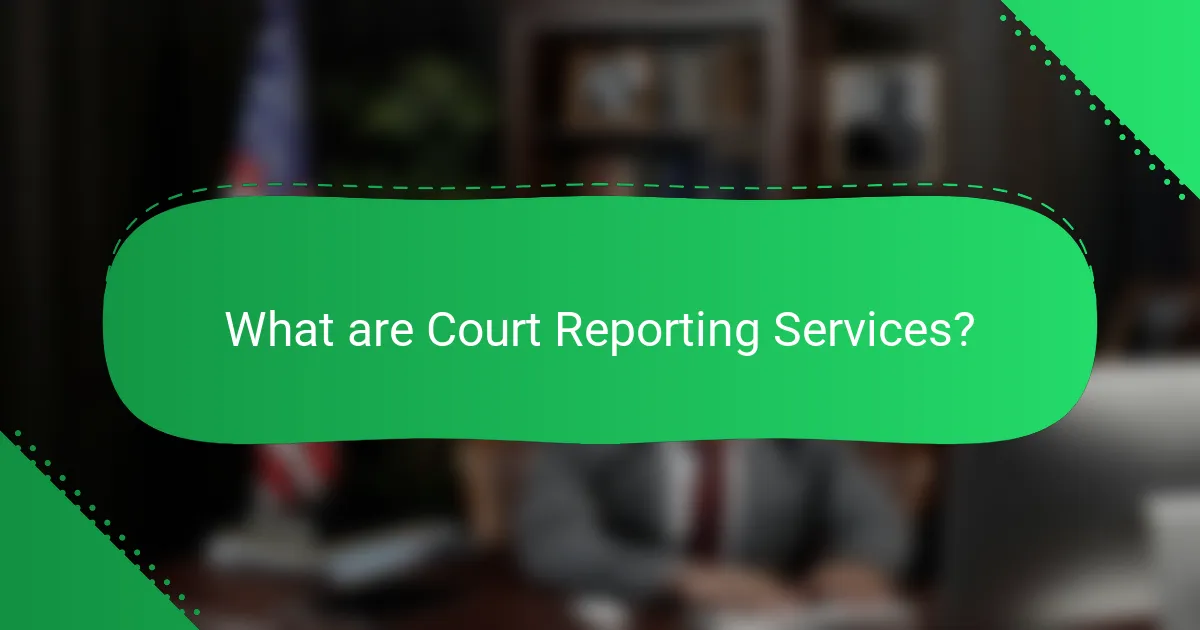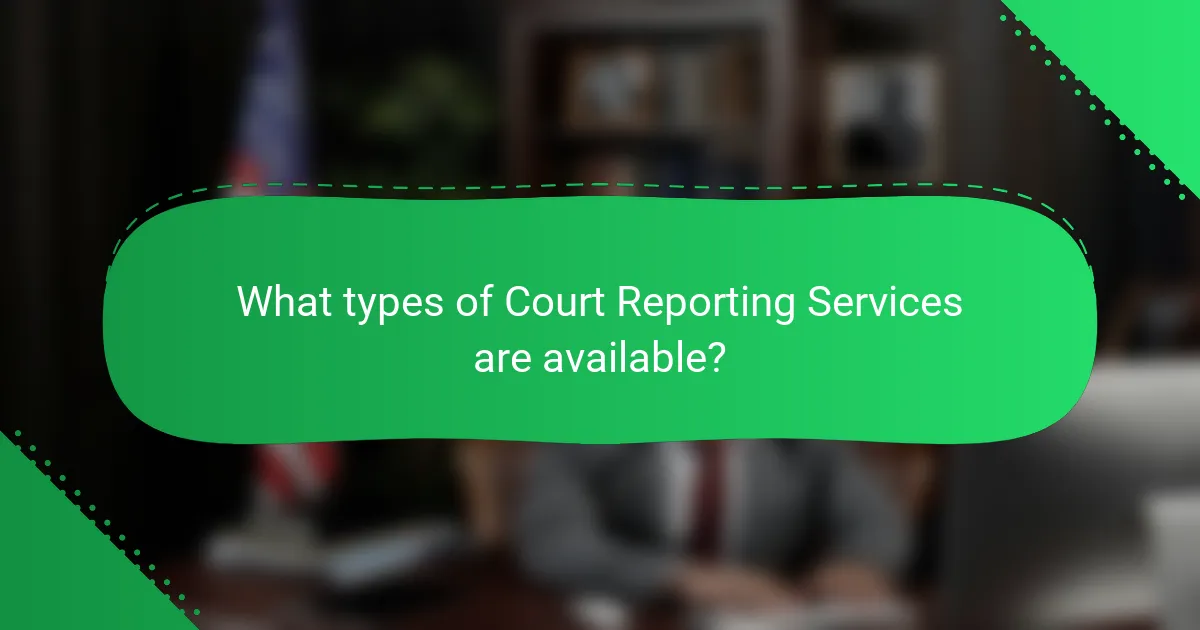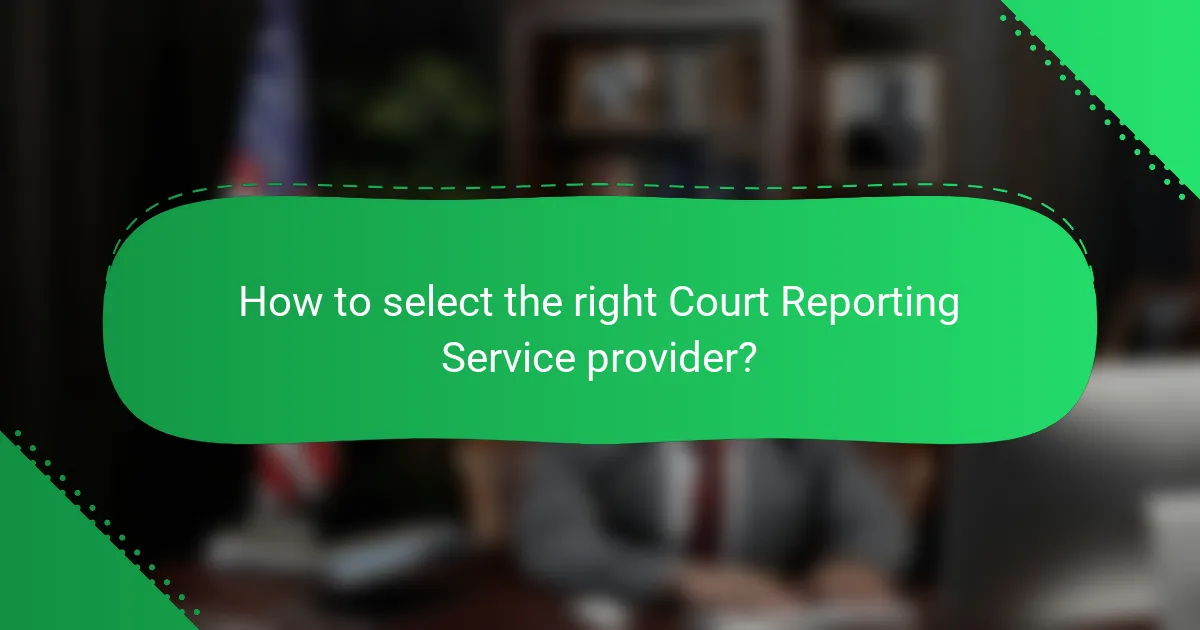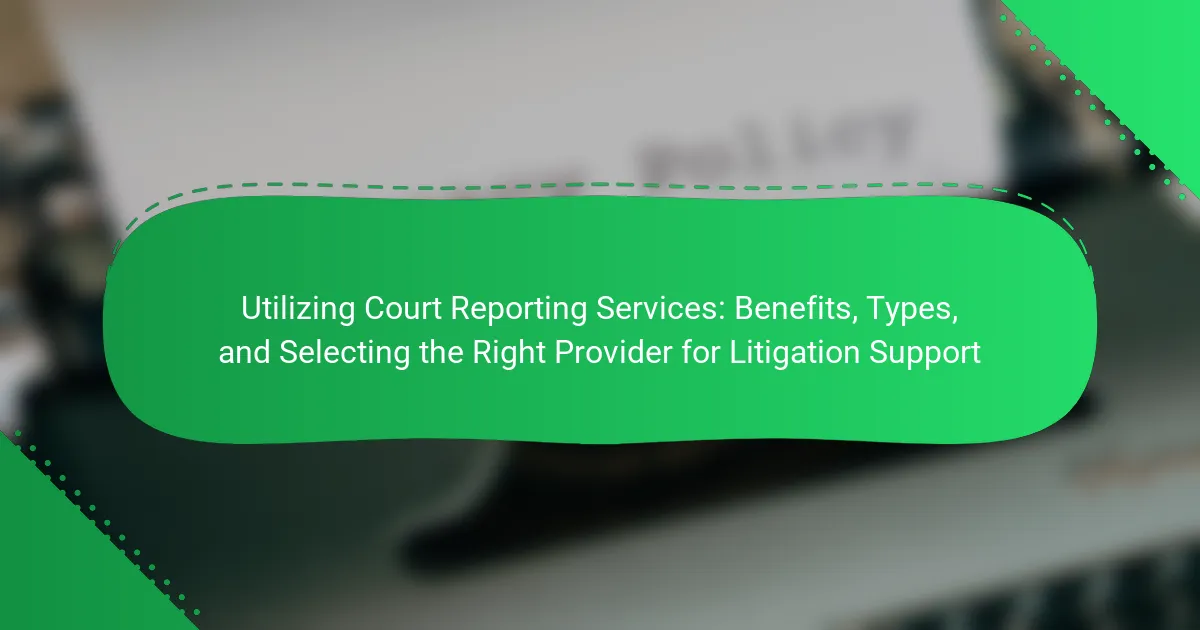Court reporting services are essential for providing accurate transcription of legal proceedings, including trials, depositions, and hearings. These services utilize specialized equipment to create verbatim records, which serve as official documentation within the judicial process, ensuring transparency and facilitating communication among all parties involved. Various types of court reporting services exist, such as traditional stenographic reporting, digital reporting, remote court reporting, and legal videography, each designed to meet specific legal needs. Selecting the right court reporting service provider involves evaluating their qualifications, technology capabilities, client feedback, and adherence to legal standards, ensuring that the chosen service aligns with the requirements of a particular case.

What are Court Reporting Services?
Court reporting services provide accurate transcription of legal proceedings. These services include recording spoken dialogue during trials, depositions, and hearings. Court reporters use specialized equipment to capture verbatim records. The transcripts produced serve as official documentation for legal cases. Court reporting is essential for ensuring transparency in the judicial process. It allows all parties to review and reference statements made during proceedings. Additionally, court reporters may offer real-time transcription services for immediate access. This enhances communication and understanding during legal events.
How do Court Reporting Services function in the legal system?
Court reporting services function by providing accurate transcription of legal proceedings. These services capture spoken words in courtrooms, depositions, and other legal events. Court reporters use specialized equipment, such as stenographic machines, to create verbatim records. The transcripts produced are vital for legal documentation and can be used in appeals or case reviews. Court reporters also provide real-time transcription services, allowing attorneys to view proceedings as they happen. Additionally, they may offer services like video depositions and document management. The accuracy and reliability of court reporting are essential for maintaining the integrity of the legal process.
What technology is involved in Court Reporting Services?
Court reporting services utilize various technologies to ensure accurate and efficient transcription of legal proceedings. Stenography machines are commonly used by court reporters to capture spoken words in real-time. These machines translate spoken language into text using shorthand symbols. Digital audio recording devices are also employed to supplement stenographic notes. They provide a backup of the proceedings for later reference. Voice recognition software is increasingly being integrated into court reporting services. This technology transcribes spoken words into text automatically. Additionally, video conferencing tools facilitate remote depositions and hearings. These technologies enhance accessibility and streamline the reporting process.
Who are the professionals behind Court Reporting Services?
Court reporting services are provided by certified court reporters. These professionals are trained to transcribe spoken words into written text. They utilize specialized equipment and techniques to ensure accuracy. Court reporters often hold certifications from recognized organizations. These certifications validate their skills and knowledge in legal procedures. Many court reporters also have backgrounds in law or journalism. This expertise enhances their understanding of legal terminology. They play a crucial role in legal proceedings, depositions, and hearings.
What are the key benefits of utilizing Court Reporting Services?
Court reporting services provide accurate and timely transcription of legal proceedings. They ensure that all spoken words are documented verbatim. This accuracy is crucial for maintaining the integrity of legal records. Court reporters are trained professionals who understand legal terminology. Their expertise contributes to the reliability of transcripts. Additionally, court reporting services often offer real-time reporting. This allows legal teams to access information instantly during proceedings. Furthermore, these services can provide certified transcripts for official use. Certified transcripts are essential for appeals and legal documentation. Overall, utilizing court reporting services enhances the efficiency and accuracy of legal processes.
How do Court Reporting Services enhance accuracy in legal documentation?
Court reporting services enhance accuracy in legal documentation by providing precise transcription of spoken words. Professional court reporters use specialized equipment to capture every word during legal proceedings. This ensures that all statements are recorded verbatim, reducing the risk of misinterpretation.
Additionally, court reporters are trained to understand legal terminology and context. Their expertise helps them accurately reflect the nuances of legal discussions. Many court reporting services also offer real-time transcription, allowing immediate access to documents. This immediacy aids in reducing errors that may occur during later transcription processes.
Furthermore, certified court reporters adhere to industry standards and practices. Their commitment to accuracy is often backed by rigorous training and certification processes. Studies show that accurate legal documentation is critical for fair trials and effective legal proceedings. Thus, the role of court reporting services is essential in maintaining the integrity of legal documentation.
What time-saving advantages do Court Reporting Services offer?
Court reporting services offer significant time-saving advantages in legal proceedings. These services provide accurate and timely transcripts of depositions and court hearings. Professional court reporters utilize advanced technology to ensure quick turnaround times. This allows attorneys to focus on case strategy rather than transcription tasks. Additionally, real-time reporting enables immediate access to information during proceedings. This can facilitate faster decision-making and reduce delays. By outsourcing transcription, legal teams can allocate resources more efficiently. Overall, court reporting services streamline the litigation process, enhancing productivity and saving valuable time.

What types of Court Reporting Services are available?
There are several types of court reporting services available. These include traditional stenographic reporting, which captures spoken dialogue in real-time. Another type is digital reporting, where audio recordings are made and later transcribed. Additionally, there are remote court reporting services that enable reporting from different locations via video conferencing. Some firms offer transcription services for previously recorded depositions or hearings. There are also services specializing in legal videography, providing video documentation of depositions. Each type of service caters to specific needs within the legal process, ensuring accurate and efficient record-keeping.
What are the different forms of Court Reporting Services?
Court reporting services include several distinct forms. These forms are traditional stenographic reporting, digital reporting, and real-time reporting.
Traditional stenographic reporting involves a court reporter using a stenotype machine to transcribe spoken words into text. This method is widely used in legal proceedings. Digital reporting employs audio recording technology to capture proceedings, which are later transcribed by a reporter. Real-time reporting allows for immediate transcription of spoken words, providing instant access to the text during proceedings.
Each form serves specific needs in the legal field. Stenographic reporting is known for its accuracy and speed. Digital reporting offers flexibility and cost-effectiveness. Real-time reporting enhances accessibility for participants who require immediate information.
What is the difference between traditional and digital court reporting?
Traditional court reporting relies on stenography, where a court reporter transcribes spoken words into written text using a specialized machine. Digital court reporting uses audio and video recording technology to capture proceedings, which are later transcribed by a separate individual. Traditional methods often require immediate transcription during court sessions, ensuring real-time accuracy. In contrast, digital reporting allows for post-session transcription, which can lead to delays in document availability. Traditional court reporters are trained to capture nuances and context, while digital reporters focus on recording clarity. The choice between the two can depend on the specific needs of a legal case, including budget and desired turnaround time for transcripts.
What specialized types of Court Reporting Services exist?
Specialized types of court reporting services include real-time reporting, video conferencing, and transcription services. Real-time reporting provides instantaneous text of spoken dialogue during court proceedings. This service is crucial for participants who require immediate access to the dialogue. Video conferencing services allow for remote depositions and hearings, enabling participation from various locations. Transcription services convert audio recordings into written documents, ensuring accurate records of proceedings. Additionally, there are services tailored for specific legal needs, such as medical malpractice cases or complex corporate litigation. Each type of service enhances the efficiency and accuracy of legal processes.
How do different types of Court Reporting Services cater to varying legal needs?
Different types of Court Reporting Services cater to varying legal needs by offering specialized solutions. For instance, traditional court reporting provides verbatim transcripts of legal proceedings. This is essential for maintaining an accurate record in court cases.
Real-time reporting allows lawyers to receive immediate transcripts during depositions or trials. This facilitates quick decision-making and strategy adjustments.
Video deposition services capture both audio and visual elements, which can be crucial for jury presentations. This enhances the impact of witness testimonies.
Remote reporting services accommodate clients who cannot be physically present, ensuring accessibility in various legal situations. This is increasingly important in a digital age.
Each service type addresses specific requirements, ensuring that legal professionals have the tools they need for effective case management.
Which type of Court Reporting Service is best for depositions?
The best type of court reporting service for depositions is a certified stenographic court reporter. Certified stenographic court reporters are trained to produce accurate and reliable transcripts in real-time. They utilize specialized equipment to capture spoken words quickly and efficiently. This ensures that all testimony is recorded without omissions. Additionally, certified reporters are familiar with legal terminology and courtroom procedures. Their expertise contributes to the credibility of the deposition process. According to the National Court Reporters Association, certified reporters maintain a high standard of accuracy. This makes them essential for legal proceedings where precision is critical.
What role do transcription services play in Court Reporting?
Transcription services are essential in court reporting as they convert spoken language into written text. They ensure accurate documentation of legal proceedings. This documentation is critical for creating official records. Transcription services help maintain the integrity of the court record. They enable easy access and review of testimonies and statements. Accurate transcripts are vital for appeals and legal references. The use of transcription services enhances the efficiency of the court reporting process. They provide a reliable means of capturing complex legal dialogue.

How to select the right Court Reporting Service provider?
To select the right Court Reporting Service provider, assess their qualifications and experience. Look for certified court reporters with a track record in your specific legal field. Verify their technology capabilities, including real-time reporting and transcription accuracy. Check client testimonials and reviews to gauge reliability and professionalism. Confirm their availability and responsiveness to your scheduling needs. Evaluate their pricing structure for transparency and value. Consider their geographical reach if remote services are necessary. Ensure they comply with legal standards and confidentiality requirements.
What criteria should be considered when choosing a Court Reporting Service provider?
When choosing a Court Reporting Service provider, consider their experience and reputation. A provider with extensive experience in court reporting ensures familiarity with legal terminology and procedures. Check their certifications and qualifications to confirm professional standards. Evaluate their technology and equipment for accuracy and reliability in transcription. Assess their turnaround time for transcripts to meet your deadlines. Review their customer service and support for responsiveness and assistance. Finally, consider their pricing structure for transparency and value. These criteria collectively ensure that the chosen provider meets the specific needs of legal proceedings.
How important is the provider’s experience and reputation?
The provider’s experience and reputation are crucial in selecting court reporting services. Experienced providers typically deliver higher quality work and accuracy. A strong reputation often indicates reliability and professionalism. According to a survey by the National Court Reporters Association, 78% of clients prioritize experience when choosing a provider. Additionally, a provider’s reputation can impact the perceived credibility of the reported information in legal proceedings. Therefore, both experience and reputation significantly influence the effectiveness of court reporting services.
What factors influence the cost of Court Reporting Services?
The cost of Court Reporting Services is influenced by several factors. These include the complexity of the case, the location of the service, and the experience of the court reporter. Additional factors are the length of the deposition or hearing and any specific technology or equipment required. For example, real-time reporting services incur higher fees due to advanced technology. Moreover, travel expenses may apply if the reporter needs to cover a long distance. Lastly, the demand for services can affect pricing, especially during peak litigation periods.
What questions should you ask potential Court Reporting Service providers?
What questions to ask potential Court Reporting Service providers include their experience and qualifications. Inquire about their certifications and the years they have been in business. Ask if they have specific expertise in the type of cases you are handling. Request information on their technology and equipment used for reporting. Clarify their turnaround times for transcripts and how they handle urgent requests. Confirm their pricing structure and any additional fees. Finally, ask for references from previous clients to assess their reliability and quality of service.
How can you assess the quality of a provider’s services?
To assess the quality of a provider’s services, evaluate their experience and credentials. Look for certifications from recognized organizations in court reporting. Review client testimonials and case studies for real-world feedback. Check their technology and equipment for modern standards. Analyze their turnaround times for transcripts and reports. Confirm their adherence to legal and ethical standards. Consider their responsiveness and communication during the service. These factors collectively indicate the provider’s service quality.
What red flags should you look for when evaluating providers?
Red flags to look for when evaluating providers include a lack of credentials and experience. Providers should have relevant certifications and a proven track record. Poor communication is another warning sign. If responses are delayed or unclear, it indicates potential issues. Additionally, watch for inconsistent pricing. Transparent pricing structures are a hallmark of reputable providers. Negative reviews or complaints can also signal problems. Researching online reviews can provide insight into provider reliability. Finally, be cautious of providers who pressure for immediate contracts. This tactic often suggests a lack of confidence in their services.
What are best practices for utilizing Court Reporting Services effectively?
To utilize Court Reporting Services effectively, clear communication with the court reporter is essential. Provide specific details about the case and any unique requirements. Schedule services in advance to ensure availability and avoid last-minute issues. Prepare all necessary documents and materials beforehand for efficient reporting. Discuss the preferred format for transcripts to meet your needs. Confirm the technology setup for remote depositions if applicable. Review transcripts promptly for accuracy and follow up on any discrepancies. Establish a good working relationship with the court reporter to facilitate smooth communication. These practices enhance the overall efficiency and effectiveness of court reporting services.
Court reporting services are essential for providing accurate transcription of legal proceedings, including trials, depositions, and hearings. These services utilize specialized equipment and technology, such as stenographic machines and digital recording devices, to ensure precise and timely documentation. The article explores various types of court reporting services, including traditional, digital, and real-time reporting, and highlights the benefits of utilizing these services for maintaining legal integrity. It also offers guidance on selecting the right court reporting service provider by considering factors such as experience, technology, and pricing, ensuring legal professionals can effectively manage their documentation needs.



